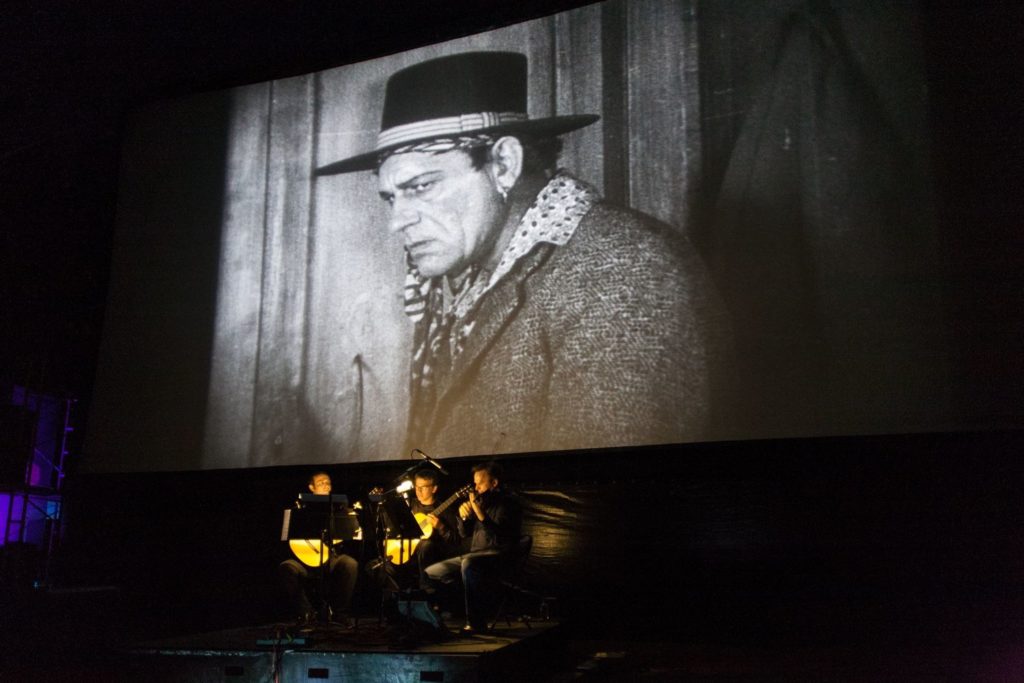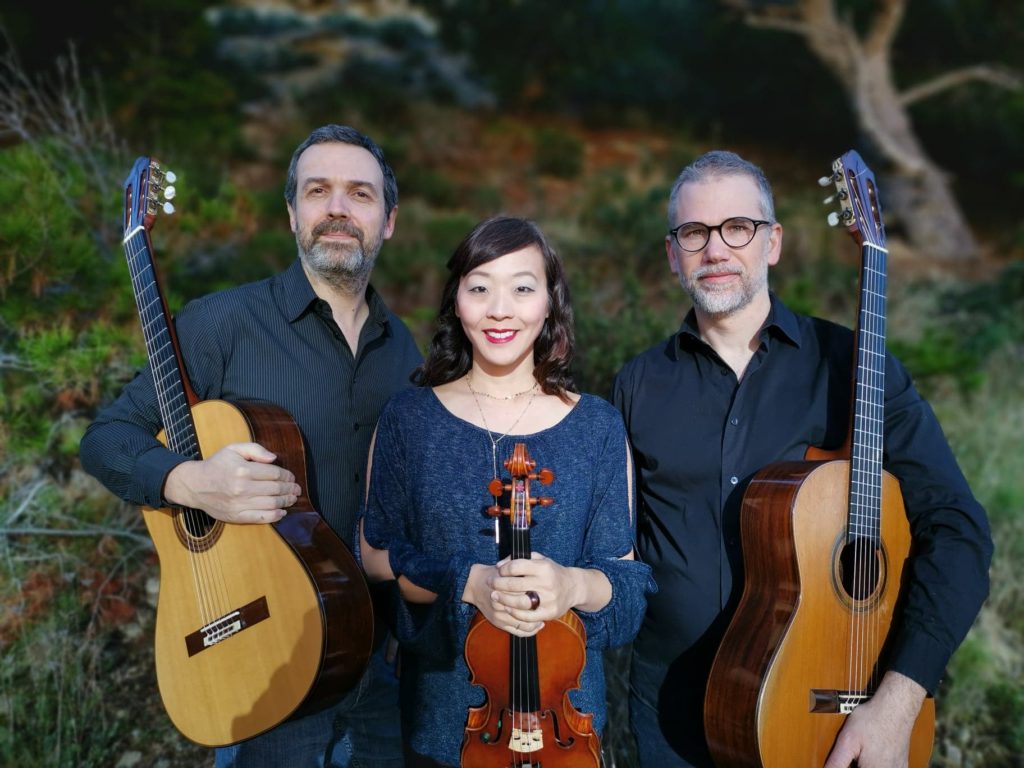by Jarrett Hoffman

Next week, Randall Avers and Benoît Albert of the guitar duo Les Frères Méduses, and violinist Jennifer Choi — or as they sometimes call each other, Randy, Ben, and Jenny — will perform the guitarists’ original score to The Unknown during a screening at The Nightlight.
That makes up the cinematic portion of Urban Troubadour’s “Dinner and a Movie” program on Monday, March 4 in Akron. A 6:30 pm dinner at Blu Plate with live music by pianist Michael Leamon will be followed by dessert, popcorn, and prosecco at 8:15 at The Nightlight.
As a prelude to the film, Avers, Albert, and Choi will play a short set that includes Marc Ribot’s Postcard from N.Y. (arranged by Avers) and the traditional Balkan folk song Pajdusko Oro. Then the lights go down, and the film begins to roll.
As for Tod Browning, writer and director of The Unknown, I can’t confirm any knife-tossing in his past. But he was plenty familiar with carnivals and circuses, having run away at age 16 to perform as a magician’s assistant, contortionist, and clown. One of his more famous films, the controversial Freaks (1932), cast circus performers with real deformities.
I say “real” because in The Unknown, the big secret of that knife-slinging character known as Alonzo the Armless is that he actually has arms. He’s played by Lon Chaney, “one of the top five greatest silent film actors,” as Avers said during a conference call that also linked in Choi. “A lot of people attest that this is his greatest performance.”
Opposite Chaney is another famous silent actor, Norman Kerry as Malabar the Mighty. And while many actors had difficulty adapting to the talkie era — or flat-out resisted it — Joan Crawford was certainly an exception, finding stardom in both genres. Here she plays Nanon Zanzi, rounding out the central love triangle of the film.
Les Frères Méduses premiered their score with violinist William Fedkenheuer in 2012 on a co-commission from Alamo Drafthouse Cinema and the Austin Classical Guitar Society. Describing the duo’s writing, Jennifer Choi said, “You hear the comedic side and the tragic side of the film, plus the element of circus.”
It’s not all original material. Avers and Albert found that mixing in bits of Ravel, Granados, and de Falla was irresistible. “There was some music that dropped in so perfectly with the score,” Avers said. They also wanted to take advantage of some of the violin’s virtuosic repertoire. “We have the Tzigane by Ravel, which just fits extremely beautifully with one of the most dramatic parts of the film,” he said.
In the silent era, live accompaniment sometimes included pre-existing music, so in a way this score follows in that tradition. Choi gave other reasons why incorporating the older music works so well.
“The film portrays gypsy life, and violin pieces like the Tzigane were pretty much meant to be gypsy music that these classical composers were hearing at the time,” she said. She also pointed out how close in time that style of music was to the making of the movie. “That was basically the popular music of the era. There were a lot more classical concerts and a lot more portrayals of gypsy music. It was very in vogue, you could say.”
As for how it all comes together? “Randy and Ben did a really great job drawing from those composers and then mixing it with their original twist,” Choi said. “I think it’s really fun.”
That set off an exchange of praise between these former classmates at Oberlin College and Conservatory. (“That was about four years ago, right?” Avers joked.)
“We’re thrilled to have Jenny here because she’s so talented — she is such a d**n good violin player,” the guitarist said. “She’s incredibly versatile and amazing to work with. We really hit a grand slam.”
Choi responded, “I’m in the same boat with Randy and Benoît. It’s really a team effort.” They’ve enjoyed the collaboration so much that they’ve expanded their repertoire into concert music — hence the prelude set they’ll play in Akron, as well as the other three stops on their short but expansive tour: Modesto (California) and Drammen and Tromsø (Norway).
Diving into the mechanics of synchronizing a live score to events happening on-screen, I mentioned how orchestra conductors sometimes rely on a big, beating, electronic dot to maintain the right pace.
“We don’t have a bouncing ball that we’re following,” Avers said. “We’re reading from a score and watching the film as we’re playing, taking cues to go to the next part. We’ve had to spend a lot of time getting this all together.” Some spots allow for a little bit of catch-up or musical stretching to get back in sync. Other times, a second too slow means missing a scene change.
A click track helps them practice. “We rely on our tempo memories when we perform,” Choi said. “It’s a little more work, but it’s worth it to keep the music as fluid as possible.”
They’ll take things a step further in Norway, where their set includes an improvised score to a second silent film, Teinosuke Kinugasa’s 1926 A Page of Madness. “That’s going to really stretch our sonic capabilities,” Choi said. “It’s nice to see one project leading to another, with all of us having to bring in every single skill that we have.”
Jennifer Choi performs in the New York-based Either/Or and Cambridge-based ECCE new music ensembles. She was a founding member of the Miró Quartet. A native of Massillon, Ohio, Randall Avers lives in Norway and teaches at the Nord-Jarlsberg Kulturskole.
You can read more about Les Frères Méduses from our 2018 interview with them here.
Published on ClevelandClassical.com February 25, 2019.
Click here for a printable copy of this article



